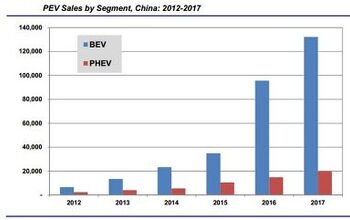China To Kill Gas Subsidies?
Paul Eisenstein of The Car Connection's Industry Insider blog thinks that China's going to cut the fuel subsidies that have insulated the Middle Kingdom from rising gas prices. Prices for gas have risen only nine percent since January 2007, compared to the nearly 80 percent jump suffered by American drivers in the same period. With the Chinese paying about $2.60 per gallon of unleaded (the exception to China's love affair with all things leaded), demand is still rising in China, with 1,300 new cars hitting the road every day in Beijing alone. So when will China make the much-needed subsidy cuts? Eisenstein joins the growing consensus that suggests the bitter medicine will be administered sometime after the Olympics, when China will be basking in global PR afterglow. With neighboring developing economies recently cutting fuel subsidies (Indonesia, Malaysia, Sri Lanka, Taiwan and India), the International Herald Tribune reports that the such cuts are necessary across the board to help keep global oil prices from spiraling out of control. With the International Energy Agency taking up the fight against subsidies, expect pressure to mount on China to end incentives for fuel consumption. Eventually.
More by Edward Niedermeyer


































Comments
Join the conversation
Since Iraq is producing more than it did during the embargo years, ending the war would have negative effect as a new civil war with more Iranian intervention would greatly reduce Iraqi oil production. And such a defeat would drive speculation even higher as Kuwaiti and Saudi oil would be threatened by the victorious Iran. The oil subsidies in oil producers like Saudi Arabia do have a cost to Saudi Arabia. That's a product they could have sold for a lot more on the open market. That's still lost govt. revenue. In fact, it's even costlier than the Chinese subsidy. The Chinese have a lot of rebuilding to do after the earthquake. Phasing out the subsidy will help to pay for that reconstruction.
A bigger problem is all the govt. interference in oil production around the world. Putin and his buddies blatant stealing of oil wealth is going to greatly inhibit further development, as it did in the Soviet era. Chavez and the mullahs are both failing to maintain the necessary infrastructure spending to keep the oil flowing. The US govt. continues to ban most development of US fields and now threatens to restrict US oil companies even more. Mexican and Nigerian govt. corruption continues to produce great inefficiencies in their efforts too. It's a complete farce.
Hold on, folks, we need to keep in mind the dictionary definition of subsidy: "a grant by a government to a private person or company to assist an enterprise deemed advantageous to the public." So not every incentive or benefit is a subsidy, and in China's (or Venezuela, etc.) case the "subsidy" goes to consumers by means of below-market pricing. Everybody's for that, right? We all want cheaper gas, houses, food, right? Of course, taking from Peter to give to Paul is a zero-sum game. The pain (or lost opportunities) is just felt elsewhere. As for that oil depletion allowance 97escort is unhappy about, percentage depletion was abolished for Big Oil long ago. (The Left keeps kicking that dead horse, because it feels so good.) Federal and state taxes on gasoline are basically user fees to support road construction and maintenance; there is no reason they should be in lockstep with a general sales tax rate. The SPR is no more an oil subsidy than banning leaded gas; both reduce what reaches the consumer market. That serves to push up not only the retail price but also the wholesale cost. It should be remembered that in the US, oil companies have to buy oil before they can sell it. And finally, neither the war in Iraq that started in 1991 nor the war against us that Iran began 29 years ago is a subsidy to our oil companies, unless one believes that any effect on global oil prices (whether it be up or down) is a subsidy to ExxonMobil.